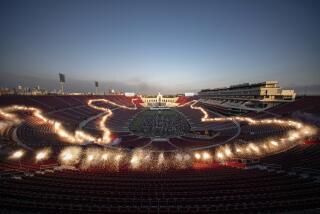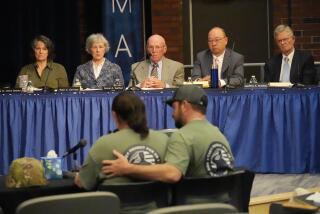Aurora theater shooting study gives suggestions to first responders

A report commissioned by the city of Aurora, Colo., in the aftermath of a 2012 mass shooting offers recommendations to law enforcement and emergency personnel.
Emergency medical workers responding to the 2012 Aurora, Colo., theater shooting were hampered in reaching victims by poor communication and a flood of 1,400 panicked moviegoers fleeing the suburban Denver theater, according to a review of the tragedy released Wednesday.
The report, commissioned by the city of Aurora, praises the quick response after James E. Holmes opened fire in the packed theater, killing 12 people and injuring 70 others. But the report also makes 80 recommendations to help guide a more comprehensive future response.
Although the first police unit arrived at the theater within two minutes of the first 911 call, the study concluded that first responders failed to make a coordinated effort to transport victims to hospitals. The report says the miscommunication did not cause any loss of life.
Holmes, now 26, burst into the Century Aurora 16 theater during a midnight showing of the Batman film “The Dark Knight Rises,” dressed in bullet-resistant protectors and tactical gloves. The incident was Colorado’s deadliest shooting since the Columbine school massacre in 1999.
Police have said records show Holmes went on a shopping spree that started in May, amassing semiautomatic weapons, large quantities of ammunition, military-style gear, chemicals that could be used for explosives, and tear gas canisters.
The report recommends that emergency officials establish a joint command area in mass-casualty events such as shootings. In the Aurora shooting, a command area was not created until hours after the incident.
The “level of risk in the theater was not discussed between police and fire commanders,” the report says, adding that arriving fire commanders did not know that police had arrested Holmes, causing delay and confusion in their response.
But the report’s authors also emphasized that “the situation was complex and there were many challenges for first responders.”
The study suggests that its findings could be used as a template by other first responders.
“The city is aware of the lessons learned, and has already taken measures to implement changes,” the report concludes. “It is hoped the findings and recommendations will be useful to other jurisdictions as well.”
The report is the latest review of the community’s response to the rampage.
Last year, an Aurora Fire Department report found that ambulances trying to reach the theater were blocked by parked cars belonging to police and movie patrons.
Wednesday’s report does not address how the shooting could have been prevented.
About a month before the massacre, Holmes told a psychiatrist he was having homicidal thoughts, and she concluded he could pose a danger to the public, according to trial documents.
john.glionna@latimes.com
More to Read
Sign up for Essential California
The most important California stories and recommendations in your inbox every morning.
You may occasionally receive promotional content from the Los Angeles Times.











